Which is the Best Space Heater for your RV?
This post may contain affiliate links.
If you camp or live in an RV in extreme cold weather, you’ll probably want to purchase some kind of heater to supplement your propane furnace. In this guide, I’ll go over several different types of electric heaters as well as a few other styles of portable heaters ideal for RVs. I’ll also recommend a few models of heaters most popular with RVers to help you decide which one would be the best space heater for your RV.
Space Heater Safety
Before choosing and buying a heater to use in your RV, I strongly recommend reading my article titled “Is It Safe to Use a Space Heater in an RV?”.
Using a space heater in an RV, or anywhere for that matter, is a safety risk. It’s important to understand the risk involved before buying a space heater.

We do use an electric heater in our fifth wheel to supplement our propane furnace. We have a Dr. Infrared heater (which I’ll talk about later) as well as a cheap ceramic heater as a backup. Since we are full-time RVers in a climate with winter temperatures that often go below freezing, it’s important to use to have a backup heating source.
See also: How We Prepare Our RV for Winter Living
A few times we’ve run out of propane in the middle of the night. When we woke up, it was in the 40s inside the RV, even with our space heater running. (Yes, we do leave it on, but with the thermostat turned down to where it will only run if the furnace shuts off).
Electricity is cheaper than propane where we live. So when we’re in our RV and the temperatures outside are above freezing, we prefer to run our space heater. However, when it’s below freezing, we always run our furnace because it heats the areas where our water and sewer systems are located and keeps them from freezing. For extreme cold, the space heater and the furnace are both needed.
That said, please extensively research, compare, read reviews, etc. before buying any heater with the intent of using it an RV.
I’ve only listed heaters with plenty of positive reviews, but your situation may be different from that of the people who recommend these space heaters. If you have any doubts about your RV’s electrical capabilities, consult an electrician for a second opinion.
Best Space Heaters for RVs
Ceramic space heaters
Ceramic heaters work by running an electric current through wires that pass through ceramic plates. These plates get warm and heat the air around them through convection. A built-in fan blows this warmed air into your room.
If you’re looking for a cheap space heater for occasional use (AKA mostly above freezing temps) a small, portable ceramic heater is probably all you need. The one pictured below has a built-in thermostat and will automatically shut off it if overheats or tips over.
- 2 in 1 heater fan: This ceramic heater offers dual heating modes (1500W/750W) plus a cool air fan, making it ideal for both winter and summer. With automatic thermostat control, it cycles on and off to maintain your preset temperature without any manual adjustment. A practical and thoughtful gift for working from home, or for family, friends, and colleagues during the cold season.
Tower heaters
Most tower-style heaters are ceramic heaters. Features like oscillation, remote control operation, and timers make them a step up from the basic ceramic heater. The Lasko model below has a safety feature that will automatically shut it off if it begins to overheat.
- POWERFUL WHOLE-ROOM HEATING: Experience comforting warmth with 1500 watts of power and an elongated ceramic heating element that delivers penetrating air velocity to circulate heat evenly throughout the room. Ideal for bedrooms, living rooms, and home offices.
Built-in faux fireplace insert heaters
A lot of RVs come with a pre-installed electric heater designed to look like a fireplace. Most of these are ceramic heaters as well.
If your RV didn’t come with one, or if you need to replace your RV fireplace heater, you can find several models of fireplace style insert heaters online.

Portable fireplace-style heaters
Decorative space heaters that look like a small wood stove are popular with many of RV owners. Some of these heaters are ceramic, but the one below is actually an infrared heater.

Struggling to stay warm in a cold camper? Follow these 6 tips for a cozy RV!
Infrared heaters
Infrared heaters use radiant heat to transfer warmth to objects in a room like how the sun warms objects it shines on. This can be more effective than simply blowing hot air into a space (though most infrared heaters also include a fan to help diffuse the heat). The Dr. Infrared heater pictured below is the model we use in our RV. We’ve used it for three years and we love it.
- Can heat up a large room with Auto Energy Saving Model With High and Low Feature. Tip-over protection and Overheat protection.Heat Up for a large room - Dual Heating System: Infrared Quartz tube + PTC for 60% more heat than others. Rated around 5200 BTU.
I especially like that it has a built-in thermostat so it’s not running constantly. It only comes on once the room drops below a certain temperature. This is a great choice for people with kids because the whole thing stays cool to the touch. Even the spot where heat is emitted is not hot enough to burn you if you accidentally touch it. This heater also has wheels and is very difficult to tip over, but would shut off instantly if it did.
Oil-filled Heaters
Oil-filled radiator-style heaters are tied with infrared as the most popular for RVers.
like the one shown below, which is one I purchased myself from Walmart.com.
Oil-filled heaters don’t burn oil. They circulate heated oil that diffuses steady, radiant heat that warms you gradually. There’s no fan blowing, so the heat produced isn’t instant, but once it warms up, it does a good job of maintaining an even temperature.
- 【Whole-Room Rapid Heating】 Relying on 1500W high power and special heating fins, it forms 360° hot air circulation to heat the whole room in seconds and last for long time without drying overly.
Micathermic Panel Heater
I don’t have personal experience with this type of heater. But when I asked full time RVers which types of heaters they liked, one type that came up was a micathermic panel heater. Micathermic heaters use a combination of radiant and convective heat. Sheets of mica are warmed through convection, and these emit radiant heat, similar to an oil-filled heater.
The slim, flat design of the DeLonghi micathermic panel heater below would make it a good choice for someone looking for a heater that won’t take up much space.
- QUIET HEATER - Best for medium and large rooms, the 1500-watt Mica Panel Heater quickly delivers gentle heat that won’t stir up dust, pollen, or dander. Customize it to your needs with easy-to-use controls, an adjustable thermostat & two settings.
Running an Electric Heater Underneath an RV
RV owners who have skirted their camper for winter sometimes run a space heater under their RV to keep pipes from freezing. Personally, I’d be wary of leaving an electric heater running under my RV unsupervised.
Additionally, I would assume doing so would require the use of an extension cord. The standard orange outdoor extension cord that many people might choose is cannot handle the 12.5 Amp draw of most space heaters. This adds additional risk.
But I do understand that on single-digit nights, this may be the only way to protect your rig.
Once, we did run a portable space heater under our RV for a few hours. Our black tank’s gate valve froze shut one day and needed to be thawed.
Normally our homemade vinyl skirting kept things plenty warm under our RV. But on this particular day, the highest temperature was in the single digits. In order to thaw our gate valve as safely as possible, we purchased a 10-gauge 50-ft. extension cord and plugged it directly into the electric post. This bypassed our RV’s wiring circuit. We also used an infrared heater that would have shut off instantly if it had tipped over.
- 10 Gauge SJTW 3 Conductor 50 Foot Extension Cord With Lighted Ends - green-extension wire outdoor extension wire 50 feet extension cord outdoor 10/3
If we lived in a colder climate where temperatures were often below zero in winter, I would set up my RV differently.
I would use reflective foam board instead of vinyl from my skirting. And I would consider placing a couple of work lights underneath the RV for particularly cold weather. Work lights like the ones below put off a fair amount of heat without drawing as much electricity as a space heater would, making these a safe way to heat your RV without posing an electrical risk. Just don’t accidentally buy an LED light, which won’t put off any heat!
- BRIGHT PORTABLE WORK LIGHTS: powered by a 500 watts halogen bulb; bring this handheld work light wherever you like; the portable work light is designed to dissipate heat to reduce re-lamping frequency and protect you from being scalded while holding it
Fuel-burning Heaters
Most RVers will want to choose electric rather than fuel-burning heaters as a supplemental heating source. However it’s a good idea to have a backup source of non-electric heat (and also a generator) in case a snowstorm causes a power outage.
Propane heaters
Not only is an indoor-use propane heater a good backup heating source for emergencies, it can also be used when boondocking.
The type of propane heater that seems to be the most popular with RV owners is the Mr. Heater “Buddy” propane heater. It’s rated as “indoor safe” which makes it ideal for emergencies.
Product currently sold out.
Still, make sure your RV is well-ventilated and your propane detector is in working order before use. It runs off 1 lb. cylinder propane tanks like those used for camp stoves, but in a pinch, you could connect it to standard RV propane tanks if you have an adapter hose.
Another propane heater popular with RVers is the Olympian Wave made by Camco. It can be mounted on a wall or stand on the floor, and is designed specifically with RVers in mind.

Many RVers say that the Olympian Wave is the best propane heater for RVs.
Wood Stoves in RVs
It sounds crazy, I know. But believe it or not, I have seen several RVs with wood burning stoves used for heat. Many of these are in stationary RV’s, but some RVers and van lifers who travel use wood stoves as well.
You can see one example below from a Winter RV Enthusiast (who preferred to remain anonymous). This RV is stationary.

For more on how to safely use a wood stove in your RV, check out this guide.
Other RV Heating Alternatives
Run your RV furnace on electricity
Would you like to be able to avoid space heaters altogether and run your RV furnace on electricity instead of propane at the flip of a switch?
A company called RV Comfort Systems makes this possible with their product CheapHeat. You can have the system installed by an RV dealer. Find out more at their website.
Electric Blankets
It’s not a heater, but if you’re looking for a way to keep yourself warm, an electric blanket might be a good option.
This electric throw blanket comes in several different colors and would be lovely to use while reading or watching TV:
- Evenly spaced heating elements deliver even heat distribution throughout. 100% UL certified and engineered to emit VIRTUALLY NO EMF radiation. Your safety is of utmost importance to us.
And this bed-sized electric blanket with dual temperature controls would be perfect for couples who can’t agree on the ideal temperature for sleeping:
Product currently sold out.
Best Space Heater for Your RV
There are many options for supplemental space heaters that can fit in your RV. Choose the type you like, be sure to read product details and reviews, and stay warm this winter.
For more winter RV tips, check out these articles:
- RV Heating 101: Options for Supplementing Your RV Furnace
- How We Prepare Our RV for Cold Weather Living
- Everything You Need to Know About RV Skirting
- How to Insulate RV Windows (Without Blocking the Light!)
- Preventing Condensation in Your RV
Ashley Mann founded RVinspiration.com in 2017. She handed off the website to new owners in 2022 to launch a new business as an online entrepreneur coach, but she still helps out as the blog editor. Ashley spent three years living full time in a 38-foot, 5th-wheel RV with her husband Josiah and their cat, Kitty. Her favorite thing about RV life is the challenge of finding the perfect way to organize a space, and she loves seeing all the creative and clever ways people come up with to customize their RVs.

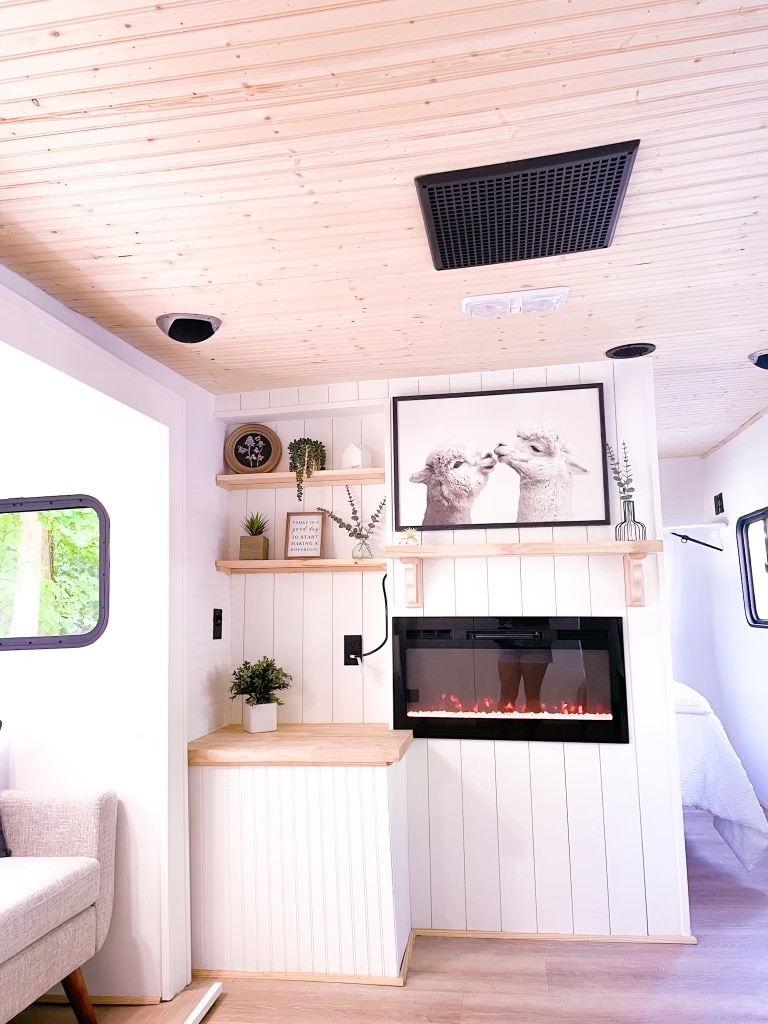

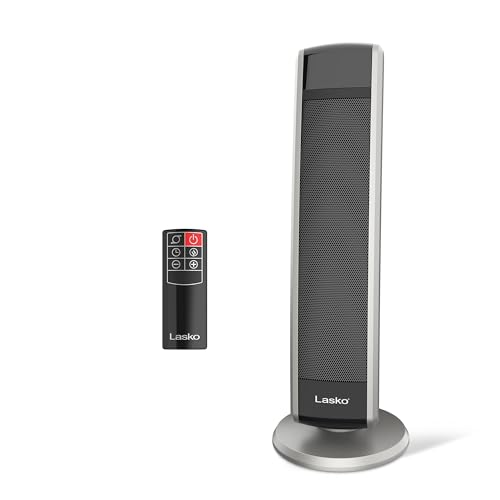




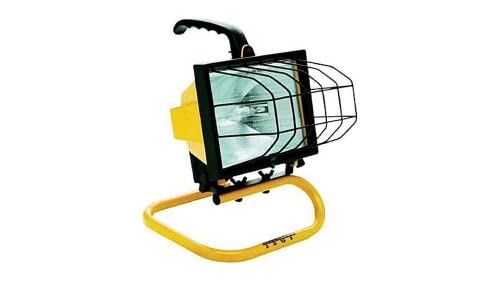





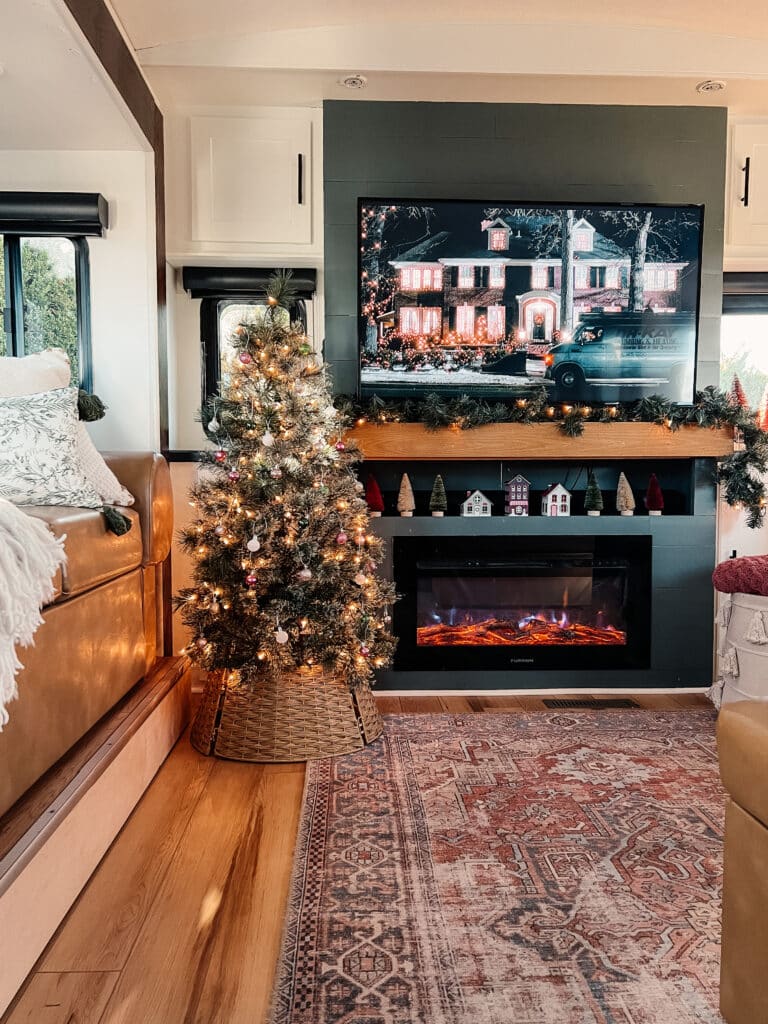

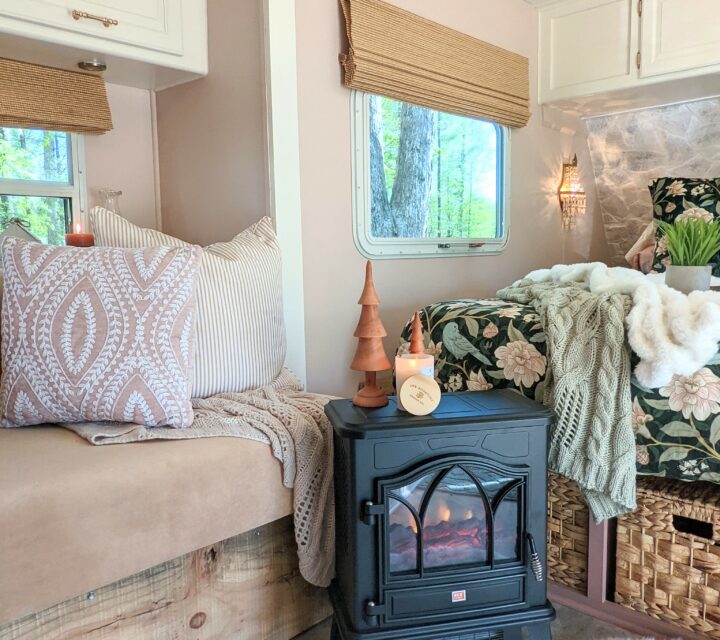
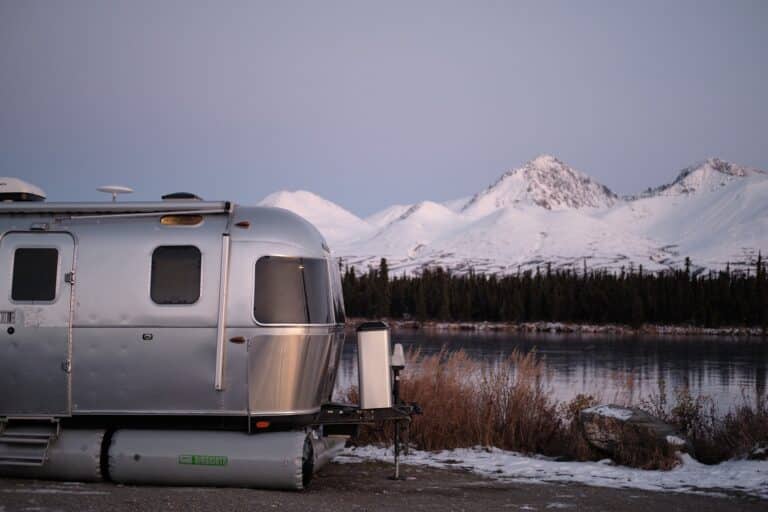
Another one that tells you all about such great ways to heat RVs and not a single word about the heaters BTUs or amps. Kind of ignorant don’t you think? What a complete waste of my time. Enjoy knowing the BTUs or amps it goes not one but of good. Common Sense? What ever happened to that?
Thank you for your feedback as to what would make this article more helpful. I’ll look up that info and add it to the article when I get a chance.
Jeeze, Harold. Calm down man.